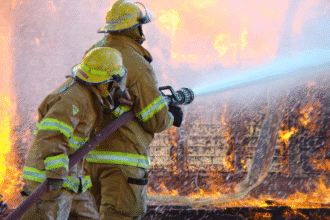The White House Press Secretary has confirmed that President Trump might decide on what to do with Iran and Israel in the next two weeks. As the tensions between Iran and Israel grew, Trump indicated that the continuous development of diplomatic talks was instrumental in determining the reaction that the U.S. could be willing to undertake. It is strategic ambiguity enshrined in the twofold references by the administration, as it opens possibilities to flexibility between the conclusion of conversations and the penetration of intelligence. This announcement has triggered an intensive watchdog by policymakers, markets, and allies who are keen on key signals in both diction and schedules. The next two weeks could be critical to the question of whether Washington will shift its diplomatic posture to active participation.
- What are the Major Propulsion of the US Action, IranIsrael Con the consideration?
- What Role Is Played by the Diplomatic Efforts?
- What are Military Options on the Table?
- What are Some Dangers of the US Action in Iran and Israel?
- What is the Role of Congressional Oversight in the Matter?
- Which Humanitarian Concerns are under the spotlight?
- How would the Decision Process Be?
- What is to be the Course of Observers in the Future Fortnight?
- Final Thoughts
What are the Major Propulsion of the US Action, IranIsrael Con the consideration?
On further scrutiny, the aggressive drive to take action against Iran’s ways of the US Iran, and Israel is a buildup on the apprehensions surrounding the nuclear ambitions of Iran. Intelligence and national security experts in the U.S. have cautioned that Tehran is close to achieving the development of a nuclear bomb- a phenomenon that would create havoc in the region, causing an international reaction. In the meantime, Iranian leaders have threatened to bring “hell” to the region in the case of direct U. S. intervention. This is an urgent dynamic only adding to the decision process; in the case of the Trump administration, time was running out where Iran could give itself a strategic advantage. Although Israel has carried out its attacks, the only force that is seen as capable of reaching the fortified locations, such as the order, is the American force; hence, the intervention of the United States is particularly significant.
What Role Is Played by the Diplomatic Efforts?
At the same time, alongside military deliberation,,s it has a continued diplomatic effort. The American ambassadors have kept a low profile in contact with opposing Iranian ambassadors despite the war factions. The European ministers will hold talks in Switzerland on peace options, and some Iranian officials have shown interest in brokering a deal with Iran but warn that the bombardment runs counter to the negotiations. Trump has implied his ultimate decision will consider the occurrence of any value in those diplomatic paths. Therefore, the US action IranIsrael is not a given, but it lies in the condition of translating talking points into practical results of a negotiation. Negotiations will be keyed and pegged upon whether there was movement on the negotiating table or not.
What are Military Options on the Table?
There have been reports that the administration is considering attacking sensitive Iranian nuclear sites, with the main one being the Fordo underground facility. The fortified bunker construction of Fordo is not reachable by most foreign militaries. Some sources reveal that Trump has ordered plan implementations that may cripple nuclear-enrichment facilities. However, the president has issued a public statement that nothing is final and that any move to make will still be awaiting the position of the US, Iran, and Israel. Therefore, military options exist, but they are on standby, losing and offsetting a still possible diplomatic breakthrough and the prospect of regional escalation.
What are Some Dangers of the US Action in Iran and Israel?
Should the U.S be involved, there may be an undue threat of a more regional war. The Iranian authorities have cautioned that military intervention would lead to a quagmire that would result in a great amount of human suffering and instability in neighbouring countries. At home, Trump is not popularly supported because some of his voters advocate a strong show of force, and some others caution against an open-ended war. That suspense draws the cautious timing in the decision-making process. Before the decision, American politicians have to weigh between forceful intervention and the prospect of the loss of civilian lives, geopolitical backfiring, and tainting the American image globally. Such variables qualify the US action Iran-Israel as a high-stakes operation. Here is the link to our article on Iran Hamas Retaliation
What is the Role of Congressional Oversight in the Matter?
A further or an additional complication is the consideration of the congressional and legal aspects. The decision to bypass Congress in the authorization of the military strike can be considered constitutional, but it still remains a debatable question. In the past, the presidents were to consult the lawmakers before engaging in hostilities, even temporarily. On the issue of whether he would want congressional authority on the US action Iran‑Israel, Trump has remained ambiguous as he has not given clear answers on the same. Such uncertainty casts doubt on how the administration is viewing executive war powers. There is, of course, a legal review that Trump will have to enter., In addition, however, there is a political consideration that Trump will have to take. And that is the political blowback which Trump might face in overstepping, or if Congress might decide to exercise its prerogative abroad.
Which Humanitarian Concerns are under the spotlight?
In the meantime, reports on the ground reveal large numbers of civilian casualties. Israel recorded 24 casualties since the war escalated, but Iranian statistics are much, much higher, about 639 deaths, one of the monitoring agencies said. These numbers increase the suspicion towards proportionality and humanitarian consequences in case the U.S. chooses to US action Iran‑Israel. The well-being of innocent populations is the most essential variable. Also, human rights cases and foreign observers will most preferably criticize any involvement of the United States, demanding caution and protection of civilians. These moralities make the equations of any U.S. attack difficult.
How would the Decision Process Be?
Exponential flexibility in his comments to the media that he would or would not do something is a sign of strategy. The administration seems to prefer a gradual process: observing the movement of diplomacy, evaluating intelligence on nuclear advances, patiently awaiting reaction by the population or allies, and possibly answering it as possible to welcome them with advance guidance to markets and allies. In this process model, time can be used to mould expectations without making any early commitments. The response of any US incentive to Iran-Israel would be closely controlled, ambitious in its goals, and only implemented when some political and operational prerequisites are fulfilled. It is a subtle policy that balances the use of force and forbearance.
What is to be the Course of Observers in the Future Fortnight?
The period of the next two weeks is a critical window for all analysts, diplomats, and investors. Swiss negotiations breakthrough may lower US pressure on Iran-Israel, whereas violence escalation may speed decision-making. Markets like oil, world equities, etc, may respond to a perceived risk. Watching the congressional indicators, population surveys, and statements by the administration will also play a significant role. Moreover, dynamic changes in any other proxy contests (i.e., in Syria, Iraq,q other Persian Gulf) might be the game changer. The interdependent nature of diplomacy, security, economics, and law will decide whether the U.S. will move ahead or take a backward step.
Final Thoughts
The decision to approach the US action, Iran, and Israel sees the administration at a critical point in foreign policy. The Middle East is at the crossroads where a brewing war area is about to take over, and the possible reality of a nuclear Iran is looking too imminent. This may be a game-changer. The decision Trump will make on this may change alliances and theaters of energy provision in the world, as well as American credibility across the world. The contemporary formulations of negotiation, military planning, and political calculation highlight the complexity in the exercise of power in a globalized world. Ultimately, what Washington does, stays, or leaves will serve as a long-term election on its presence in the region in the future.








